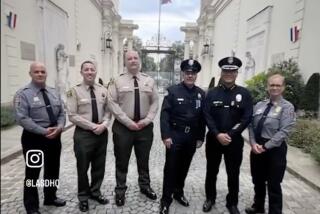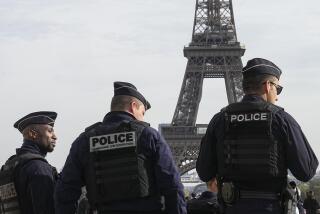After a halting run-up, London Olympics security has been solid
LONDON -- After a chaotic and embarrassing start, the Olympic security operation wraps up this weekend without major incident or much complaint.
It looks to be a face-saving ending for organizers, who were blasted in the months leading up to Games for a multitude of potential security lapses. The criticism reached its peak two weeks before the opening ceremony when the British firm picked to oversee security announced that it had not hired enough guards.
The admission forced the British government to add 3,500 soldiers to the armed forces already scheduled for Olympic duty. In the end, more than 18,000 troops were assigned to protect the Games, making it the largest-ever peacetime security operation in the country’s history.
PHOTOS: 2012 London Olympics | Day 15
Many worried the troops’ presence would harm the host country’s image, making it seem cold and militaristic with the world watching. But, to the contrary, the soldiers have been among the Games’ most amiable ambassadors as they work airport-style security lines, protect venues and accept their unplanned role as seat fillers for lower-profile sporting events with enthusiasm.
Wearing fatigues and military berets, the troops often strike up conversations with spectators and journalists while on duty, chatting about the latest medal counts and various British athletes. Though many have recently returned from Afghanistan, they seem to have embraced their temporary role here.
“It was a big decision a few weeks back to say: Look, we are not going to hit the numbers with our private security guarding force, we are going to make a radical change, ensure we have sufficient military because we are absolutely focused on the performance of security at the Games being perfect,” said Paul Deighton, chief executive of London 2012. “The customer experience — no queues, everybody is getting in, wonderful service — has demonstrated we did the right thing to fix that absolutely.”
In an effort spotlight the troops’ performance and applaud the once-controversial decision to bolster the military presence, both Games chief Sebastian Coe and soccer star David Beckham recently made well-publicized visits to the armed forces to thank them for their efforts.
“They’re doing an incredible job, what they’ve done so far,” Beckham told reporters Friday. “They’re keeping everyone calm and letting people enjoy the Games. People have been coming from all over the world and being kept safe by these guys.”
Safety concerns have loomed large over these Olympics since four Islamic extremists from Britain killed 52 people in suicide bomb attacks on the capital the day after the city was awarded the Games in 2005.
In the months leading up to opening ceremony, the British press had made exposing security concerns a national sport. The most widely reported scandals included a worker who smuggled a fake device into Olympic Park in order to spotlight holes in the protection plan and a whistle blower who spoke out when students recruited to help at the events were given answers to an important safety test.
Though organizers stress there has never been a specific threat to the Games, they developed an $850-million security blueprint that included more than 36,000 soldiers, police officers and private guards, as well as American law-enforcement officials. With 10,000 athletes slated to compete here, the plan meant there would be more than three security personnel for every competitor.
Organizers also installed roughly 1,800 surveillance cameras in Olympic Park, in addition to utilizing the more than 80,000 controlled public transportation systems, railways and private businesses. At least six surface-to-air missiles have been positioned on East London rooftops, a security measure that some residents unsuccessfully fought in court.
Now with a single day left in the Games, it’s clear that officials are preparing to exhale.
“We still have a weekend to go, but I am sure our opinion will not change,” said Gunilla Lindberg, the Swedish sports official who heads the Assn. of National Olympic Committees. “It will be a very, very good Games to remember for all of us.”
twitter.com/stacystclair
More to Read
Go beyond the scoreboard
Get the latest on L.A.'s teams in the daily Sports Report newsletter.
You may occasionally receive promotional content from the Los Angeles Times.






